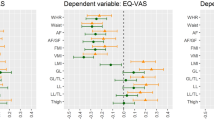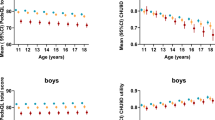Abstract
Objective:
To compare the content covered by twelve obesity-specific health status measures using the International Classification of Functioning, Disability and Health (ICF).
Design:
Obesity-specific health status measures were identified and then linked to the ICF separately by two trained health professionals according to standardized guidelines. The degree of agreement between health professionals was calculated by means of the kappa (κ) statistic. Bootstrapped confidence intervals (CI) were calculated. The obesity-specific health-status measures were compared on the component and category level of the ICF.
Measurements:
Twelve condition-specific health-status measures were identified and included in this study, namely the obesity-related problem scale, the obesity eating problems scale, the obesity-related coping and obesity-related distress questionnaire, the impact of weight on quality of life questionnaire (short version), the health-related quality of life questionnaire, the obesity adjustment survey (short form), the short specific quality of life scale, the obesity-related well-being questionnaire, the bariatric analysis and reporting outcome system, the bariatric quality of life index, the obesity and weight loss quality of life questionnaire and the weight-related symptom measure.
Results:
In the 280 items of the eight measures, a total of 413 concepts were identified and linked to the 87 different ICF categories. The measures varied strongly in the number of concepts contained and the number of ICF categories used to map these concepts. Items on body functions varied form 12% in the obesity-related problem scale to 95% in the weight-related symptom measure. The estimated κ coefficients ranged between 0.79 (CI: 0.72, 0.86) at the component ICFs level and 0.97 (CI: 0.93, 1.0) at the third ICF's level.
Conclusion:
The ICF proved highly useful for the content comparison of obesity-specific health-status measures. The results may provide clinicians and researchers with new insights when selecting health-status measures for clinical studies in obesity.
This is a preview of subscription content, access via your institution
Access options
Subscribe to this journal
Receive 12 print issues and online access
$259.00 per year
only $21.58 per issue
Buy this article
- Purchase on Springer Link
- Instant access to full article PDF
Prices may be subject to local taxes which are calculated during checkout
Similar content being viewed by others
References
WHO. World health report 2002: reducing rrisks, promoting healthy life. World Health Organization: Geneva, 2002.
Flegal KM, Carroll MD, Ogden CL, Johnson CL . Prevalence and trends in obesity among US adults, 1999–2000. JAMA 2002; 288: 1723–1727.
WHO. Diet, Nutrition and the Prevention of Chronic Diseases. Report of a Joint WHO/FAO Expert Consultation. World Health Organization 2003.
Fontaine KR, Redden DT, Wang C, Westfall AO, Allison DB . Years of life lost due to obesity. JAMA 2003; 289: 187–193.
Pi-Sunyer FX . Medical hazards of obesity. Ann Intern Med 1993; 119: 655–660.
Health NIo. The Practical Guide: Identification, Evaluation, and Treatment of Overweight and Obesity in Adults. National Institute of Health. Publication number 00-4084 2000.
Seidell JC . The impact of obesity on health status: some implications for health care costs. Int J Obes Relat Metab Disord 1995; 19: S13–S16.
Fontaine KR, Cheskin LJ, Barofsky I . Health-related quality of life in obese persons seeking treatment. J Fam Pract 1996; 43: 265–270.
Fine JT, Colditz GA, Coakley EH, Moseley G, Manson JE, Willett WC et al. A prospective study of weight change and health-related quality of life in women. JAMA 1999; 282: 2136–2142.
Larsson U, Karlsson J, Sullivan M . Impact of overweight and obesity on health-related quality of life – a Swedish population study. Int J Obes Relat Metab Disord 2002; 26: 417–424.
Kolotkin RL, Meter K, Williams GR . Quality of life and obesity. Obes Rev 2001; 2: 219–229.
Wolf AM . Introduction: Task Force on Developing Obesity Outcomes and Learning Standards (TOOLS). Obes Res 2002; 10 Supplement: (Suppl 1): 1S–2S.
Shape Up America, American Obesity Association. Guidance for Treatment of Adult Obesity. Bethesda, MD (available from Shape Up America! at 6707 Democracy Boulevard, Suite 107, Bethesda, MD 20817.- URL: http://www.shapeup.org ) 1996.
Wadden TA, Phelan S . Assessment of quality of life in obese individuals. Obes Res 2002; 10 Supplement: (Suppl 1): 50S–57S.
Cieza A, Brockow T, Ewert T, Amman E, Kollerits B, Chatterji S et al. Linking health-status measurements to the international classification of functioning, disability and health. J Rehabil Med 2002; 34: 205–210.
Kushner RF, Foster GD . Obesity and quality of life. Nutrition 2000; 16: 947–952.
Fontaine KR, Barofsky I . Obesity and health-related quality of life. Obes Rev 2001; 2: 173–182.
Oria HE, Moorehead MK . Bariatric analysis and reporting outcome system (BAROS). Obes Surg 1998; 8: 487–499.
Weiner S, Sauerland S, Fein M, Blanco R, Pomhoff I, Weiner RA . The Bariatric Quality of Life index: a measure of well-being in obesity surgery patients. Obes Surg 2005; 15: 538–545.
Niero M, Martin M, Finger T, Lucas R, Mear I, Wild D et al. A new approach to multicultural item generation in the development of two obesity-specific measures: the Obesity and Weight Loss Quality of Life (OWLQOL) questionnaire and the Weight-Related Symptom Measure (WRSM). Clin Ther 2002; 24: 690–700.
Patrick DL, Bushnell DM, Rothman M . Performance of two self-report measures for evaluating obesity and weight loss. Obes Res 2004; 12: 48–57.
Cohen J . A coefficient of agreement for nomnal scales. Educ Psychol Meas 1960; 37–46.
Vierkant RA . A SAS macro for calculating bootstrapped confidence intervals about a kappa coefficient. SAS Users Group International Online Proceedings. 2000.
Sullivan M, Karlsson J, Sjostrom L, Backman L, Bengtsson C, Bouchard C et al. Swedish obese subjects (SOS) – an intervention study of obesity. Baseline evaluation of health and psychosocial functioning in the first 1743 subjects examined. Int J Obes Relat Metab Disord 1993; 17: 503–512.
Karlsson J, Taft C, Sjostrom L, Torgerson JS, Sullivan M . Psychosocial functioning in the obese before and after weight reduction: construct validity and responsiveness of the Obesity-related Problems scale. Int J Obes Relat Metab Disord 2003; 27: 617–630.
Karlsson J, Persson LO, Sjostrom L, Sullivan M . Psychometric properties and factor structure of the Three-Factor Eating Questionnaire (TFEQ) in obese men and women. Results from the Swedish Obese Subjects (SOS) study. Int J Obes Relat Metab Disord 2000; 24: 1715–1725.
Stunkard AJ, Messick S . The three-factor eating questionnaire to measure dietary restraint, disinhibition and hunger. J Psychosom Res 1985; 29: 71–83.
Ryden A, Karlsson L, Persson O, Sjöström L, Sullivan M . The obesity-related coping questionnaire (OCQ) from the swedish obese subjects (SOS) study. Qual Life Res 1999; 8: 580A.
Ryden A, Karlsson J, Persson LO, Sjostrom L, Taft C, Sullivan M . Obesity-related coping and distress and relationship to treatment preference. Br J Clin Psychol 2001; 40: 177–188.
Ryden A, Karlsson J, Sullivan M, Torgerson JS, Taft C . Coping and distress: what happens after intervention? A 2-year follow-up from the Swedish Obese Subjects (SOS) study. Psychosom Med 2003; 65: 435–442.
Kolotkin RL, Head S, Hamilton M, Tse CK . Assessing impact of weight on quality of life. Obes Res 1995; 3: 49–56.
Kolotkin RL, Crosby RD, Kosloski KD, Williams GR . Development of a brief measure to assess quality of life in obesity. Obes Res 2001; 9: 102–111.
Mathias SD, Williamson CL, Colwell HH, Cisternas MG, Pasta DJ, Stolshek BS et al. Assessing health-related quality-of-life and health state preference in persons with obesity: a validation study. Qual Life Res 1997; 6: 311–322.
Butler GS, Vallis TM, Perey B, Veldhuyzen van Zanten SJ, MacDonald AS, Konok G . The Obesity Adjustment Survey: development of a scale to assess psychological adjustment to morbid obesity. Int J Obes Relat Metab Disord 1999; 23: 505–511.
Le Pen C, Levy E, Loos F, Banzet MN, Basdevant A . ‘Specific scale’ compared with ‘generic’ scale: a double measurement of the quality of life in a French community sample of obese subjects. J Epidemiol Commun Health 1998; 52: 445–450.
Mannucci E, Ricca V, Barciulli E, Di Bernardo M, Travaglini R, Cabras PL et al. Quality of life and overweight: the obesity related well-being (Orwell 97) questionnaire. Addict Behav 1999; 24: 345–357.
McElroy SL, Kotwal R, Malhotra S, Nelson EB, Keck PE, Nemeroff CB . Are mood disorders and obesity related? A review for the mental health professional. J Clin Psychiatry 2004; 65: 634–651, quiz 730.
Resta O, Foschino Barbaro MP, Bonfitto P, Giliberti T, Depalo A, Pannacciulli N et al. Low sleep quality and daytime sleepiness in obese patients without obstructive sleep apnoea syndrome. J Intern Med 2003; 253: 536–543.
Daansen PJ . Cognitive behavioural therapy for weight reduction in primary obesity. Huisarts Wetenschap 2003; 46: 262–266.
Stunkard AJ, Sobal J . Psychosocial consequences of obesity. In: Brownell K, Fairburn C (eds). Eating Disorder and Obesity. Guilford Press: New York/London, 1995.
Stucki A, Daansen P, Fuessl M, Cieza A, Huber E, Atkinson R et al. ICF core sets for obesity. J Rehabil Med 2004; 107–113.
Chambliss HO, Finley CE, Blair SN . Attitudes toward obese individuals among exercise science students. Med Sci Sports Exerc 2004; 36: 468–474.
Stunkard AJ, Wadden TA . Psychological aspects of severe obesity. Am J Clin Nutr 1992; 55: 524S–532S.
Rand CS, Macgregor AM . Morbidly obese patients’ perceptions of social discrimination before and after surgery for obesity. South Med J 1990; 83: 1390–1395.
Klesges RC, Klem ML, Hanson CL, Eck LH, Ernst J, O’Laughlin D et al. The effects of applicant's health status and qualifications on simulated hiring decisions. Int J Obes Relat Metab Disord 1990; 14: 527–535.
Acknowledgements
We thank Professor U Buergi (Head Department of Internal Medicine, University Hospital Bern, Switzerland) for supporting the work, and Barbara Kollerits (ICF Research Branch, WHO FIC Collaborating Center Germany (DIMDI), IHRS, University of Munich, Munich, Germany), and members of the groups who were involved in the linking procedure for the data management.
Author information
Authors and Affiliations
Corresponding author
Rights and permissions
About this article
Cite this article
Stucki, A., Borchers, M., Stucki, G. et al. Content comparison of health status measures for obesity based on the international classification of functioning, disability and health. Int J Obes 30, 1791–1799 (2006). https://doi.org/10.1038/sj.ijo.0803335
Received:
Revised:
Accepted:
Published:
Issue Date:
DOI: https://doi.org/10.1038/sj.ijo.0803335
Keywords
This article is cited by
-
What Are We Really Measuring? A Content Comparison of Swallowing Outcome Measures for Head and Neck Cancer Based on the International Classification of Functioning, Disability and Health (ICF)
Dysphagia (2019)
-
Obesity in the Context of Aging: Quality of Life Considerations
PharmacoEconomics (2015)
-
Concurrent comparison of the measurement properties of generic and disease-specific questionnaires in obese inpatients
Journal of Endocrinological Investigation (2014)
-
Predictors of weight loss after an intensive lifestyle intervention program in obese patients: a 1-year prospective cohort study
Health and Quality of Life Outcomes (2013)
-
Content identification of the IWQOL-Lite with the International Classification of Functioning, Disability and Health
Quality of Life Research (2011)



